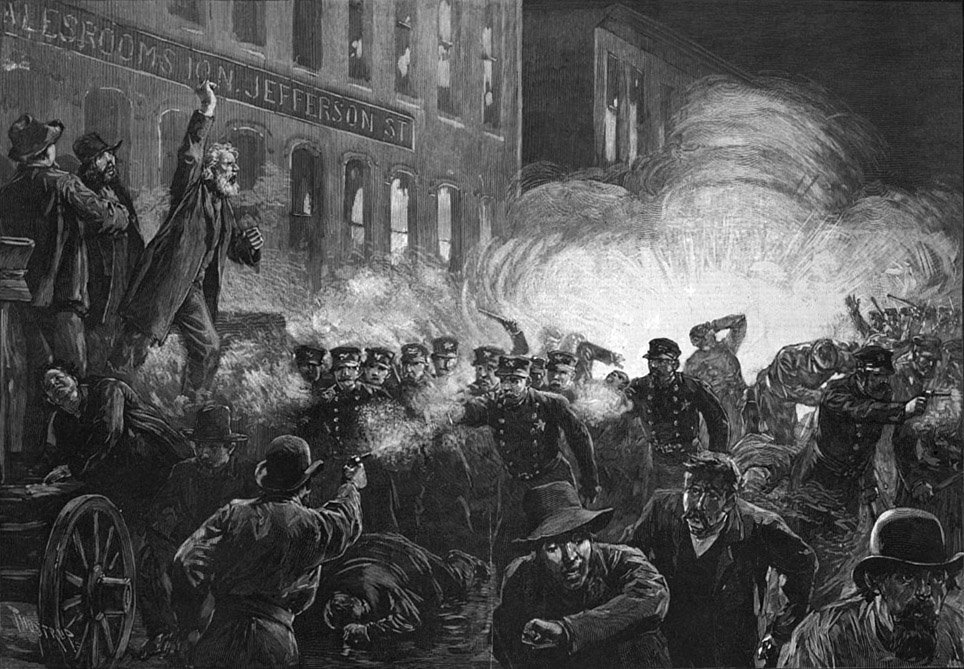The Haymarket affair (also known as the Haymarket massacre, the Haymarket riot, the Haymarket Square riot, or the Haymarket Incident) was the aftermath of a bombing that took place at a labor demonstration on May 4, 1886, at Haymarket Square in Chicago, Illinois, United States. It began as a peaceful rally in support of workers striking for an eight-hour work day, the day after police killed one and injured several workers. An unknown person threw a dynamite bomb at the police as they acted to disperse the meeting, and the bomb blast and ensuing gunfire resulted in the deaths of seven police officers and at least four civilians; dozens of others were wounded.
In the internationally publicized legal proceedings that followed, eight anarchists were convicted of conspiracy. The evidence was that one of the defendants may have built the bomb, but none of those on trial had thrown it. Seven were sentenced to death and one to a term of 15 years in prison. Illinois Governor Richard J. Oglesby commuted two of the sentences to terms of life in prison; another committed suicide in jail rather than face the gallows. The other four were hanged on November 11, 1887. In 1893, Illinois Governor John Peter Altgeld pardoned the remaining defendants and criticized the trial.The Haymarket Affair is generally considered significant as the origin of International Workers' Day held on May 1, and it was also the climax of the social unrest among the working class in America known as the Great Upheaval. According to labor historian William J. Adelman:
No single event has influenced the history of labor in Illinois, the United States, and even the world, more than the Chicago Haymarket Affair. It began with a rally on May 4, 1886, but the consequences are still being felt today. Although the rally is included in American history textbooks, very few present the event accurately or point out its significance.
The site of the incident was designated a Chicago landmark in 1992, and a sculpture was dedicated there in 2004. In addition, the Haymarket Martyrs' Monument was designated a National Historic Landmark in 1997 at the defendants' burial site in Forest Park.

1886May, 4
Haymarket affair: A bomb is thrown at policemen trying to break up a labor rally in Chicago, United States, killing eight and wounding 60. The police fire into the crowd.
Choose Another Date
Events on 1886
- 23Feb
Julia Brainerd Hall
Charles Martin Hall produced the first samples of man-made aluminum, after several years of intensive work. He was assisted in this project by his older sister, Julia Brainerd Hall. - 27Mar
Apache Wars
Geronimo, Apache warrior, surrenders to the U.S. Army, ending the main phase of the Apache Wars. - 29May
John Pemberton
The pharmacist John Pemberton places his first advertisement for Coca-Cola, which appeared in The Atlanta Journal. - 10Jun
Pink and White Terraces
Mount Tarawera in New Zealand erupts, killing 153 people and burying the famous Pink and White Terraces. Eruptions continue for three months creating a large, 17 km long fissure across the mountain peak. - 30Jun
Port Moody, British Columbia
The first transcontinental train trip across Canada departs from Montreal. It arrives in Port Moody, British Columbia on July 4.

 English
English  español
español  français
français  português
português  русский
русский  العربية
العربية  简体中文
简体中文